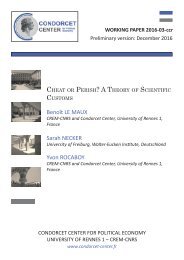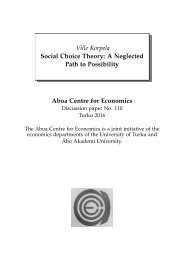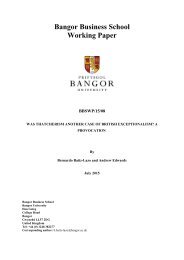MEMORANDUM
n?u=RePEc:hhs:osloec:2016_018&r=hpe
n?u=RePEc:hhs:osloec:2016_018&r=hpe
Create successful ePaper yourself
Turn your PDF publications into a flip-book with our unique Google optimized e-Paper software.
“There is another point I would like to mention. You say that the transformation<br />
processes can be lumped together in such a way that all the f i<br />
become equal. Of course<br />
from the purely logical viewpoint this true, but if such a lumping together is done, we<br />
may get results that have very little economic meaning. If the f <br />
i<br />
shall have economic<br />
significance they must be interpreted as marginal costs or something of that sort<br />
referring to concrete processes of the type we know from actual economic life, and if<br />
they are defined in this way, they may of course turn out to have definite magnitudes.<br />
But this is not all. Even from a purely logical viewpoint, there is something which<br />
makes it perfectly artificial to assume all the derivatives equal; these derivatives<br />
depend of course on the magnitudes of the various variables involved so that for one<br />
set of values of these variables one would have to adopt one system of sub-division for<br />
the process, and for another set of variables another kind of sub-division would have<br />
to be adopted. The whole system of division would simply change continually as the<br />
general system of general parameter (prices, quantities, etc.) changes in the market.<br />
This leads to so much arbitrariness that I do not see how the idea of equality of<br />
derivatives can help to shed light on the normal happenings.<br />
There is, however, no need to assume these various derivatives equal. It seems<br />
that your whole argument could be developed without making such an assumption. (…)<br />
If you would like to work through your paper once more with these various things<br />
in your mind, I should be very much interested if you would submit a new version of it<br />
for consideration with a view to its being published in Econometrica. But some such<br />
revision appears to me to be essential as I do not think we could accept the paper in its<br />
present shape. Your manuscript is returned herewith.”<br />
Three weeks later Leontief sent a revised version to Frisch with the title changed to<br />
Vertical repercussions in a chain of production processes:<br />
Leontief to Frisch, 26 January 1934.<br />
“I am sending you a new version of my article on “Vertical Repercussions”<br />
adjusted and brought in line with your requirements.<br />
The assumption f <br />
1<br />
f <br />
2<br />
... f <br />
n<br />
is dropped and the mathematical treatment<br />
changed accordingly. The problem of scale of measurements to [be] discussed in an<br />
additional footnote on page 17 (addendum).<br />
It would be rather difficult for me to make new computations and to redraft the<br />
graphs, but one explanatory sentence in the text will, I hope, preclude any<br />
misunderstanding in this respect.”<br />
Leontief’s revision of the paper did not satisfy Frisch:<br />
94





